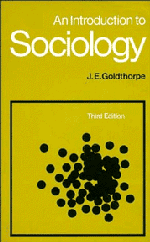2 - Sociology and social anthropology
Published online by Cambridge University Press: 05 July 2011
Summary
In the previous chapter, I passed quickly over the relation between sociology and social anthropology. We must now go into more detail.
Sociological studies of the early nineteenth century had a strongly evolutionary orientation. Early sociologists took it for granted that, just as evolution had occurred among living organisms from simple and lowly forms of life to more complex and more highly specialized plants and animals, so human societies had evolved from small to large, from simple to complex, and from those with little control over their environment to those that could adapt themselves to changed circumstances effectively. Auguste Comte (1798–1857), who is generally regarded as the founding father of our science, set out its aims thus:
the study of social phenomena considered in the same spirit as astronomical, physical, chemical or physiological phenomena, that is, subject to natural invariable laws, the discovery of which is the special object of investigation … to discover through what fixed series of successive transformations the human race, starting from a state not superior to that of the societies of the great apes, gradually led us to the point at which civilized Europe finds itself today.
A remarkable passage to have been published in 1822, twentyseven years before The Origin of Species!
Another early sociologist, Herbert Spencer (1820–1903) – regarded as fellow founding father with Comte – also took a strongly evolutionary point of view.
- Type
- Chapter
- Information
- An Introduction to Sociology , pp. 31 - 43Publisher: Cambridge University PressPrint publication year: 1985



